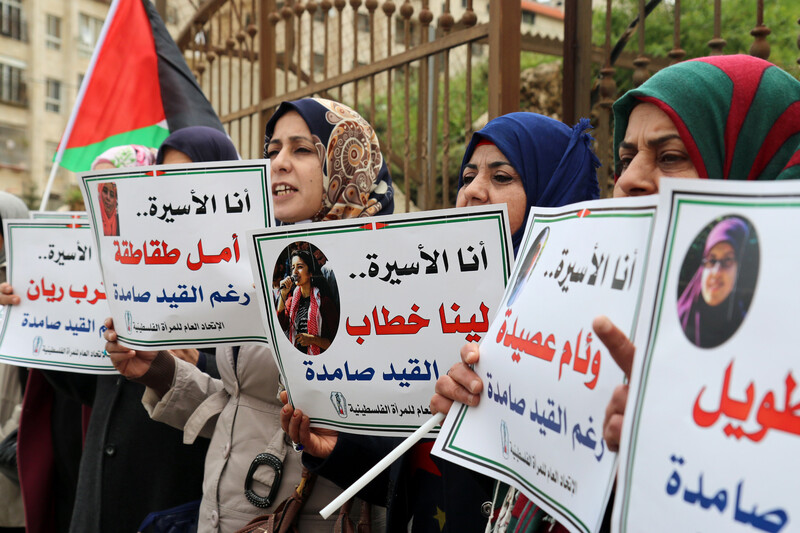Rights and Accountability 8 March 2017

Over 50 years of occupation, more than 10,000 Palestinian women have been detained by Israeli forces.
ActiveStillsDozens of Palestinian women and girls are spending International Women’s Day inside Israeli prisons this year.
There are currently 55 Palestinian females held in Israeli prisons and detention facilities, including 12 girls and 16 mothers, according to a statement from prisoners’ rights group Addameer and antiwar group CodePink.
“Testimonies by Palestinian women and girls highlight the brutality of the arrest process as well as conditions inside Israeli interrogation, detention and prison centers and even hospitals while in custody,” the groups say in a statement released this week detailing Israel’s violations of the rights of female detainees.
They note that the Convention on the Elimination of all Forms of Discrimination against Women – a UN treaty ratified by Israel and known as the bill of rights for women – affirms that “the eradication of apartheid, all forms of racism, racial discrimination, colonialism, neocolonialism, aggression, foreign occupation and domination and interference in the internal affairs of states is essential to the full enjoyment of the rights of men and women.”
“Told to die”
One case, that of 16-year-old Marah Bakir, exemplifies the abuses girls endure at every stage of Israel’s arrest process, the groups say.
Marah was shot 10 times before she was arrested in October 2015, accused, according to Addameer, of intending to stab an Israeli soldier near her school in occupied East Jerusalem.
Though Marah has insisted that she had no intention to carry out such an attack, she was sentenced in January to more than eight years in prison.
Israeli forces first brought Marah to a hospital, where her leg and wrist were shackled to the bed and she was watched by two male guards.
“One of the guards told her to die, and another guard took a ‘selfie’ with her against her will,” according to the statement.
When Marah was transferred to prison, Israeli authorities denied her adequate medical care.
Over five decades of military occupation in the West Bank and Gaza Strip, more than 10,000 Palestinian women have been detained by Israeli forces.
Like Palestinian boys and men, the girls and women are often arrested during violent night raids or at military checkpoints. They are frequently blindfolded, their hands tied and then they are taken to an interrogation center in a military jeep.
They usually are not told why they have been arrested, or given access to an attorney. Harsh interrogations, sometimes amounting to torture, can last for days.
Torture
Israeli interrogators use the same torture methods on women as they do on men, including sleep deprivation, denial of food and water, basic hygiene and access to toilets. They are also subjected to sexual harassment and painful stress positions.
One 22-year-old woman recounted to Addameer in June that an Israeli interrogator “told me that he would stay with me all night, and then he tied my hands behind the back of the chair with strapped restrictions on the chair I sat in, and I was kept in this position from 10 pm to 4:30 am.”
The young woman was detained last April by Israeli forces during a night raid on her home in Abu Dis, a Jerusalem-area village cut off from the rest of the city by Israel’s wall, and taken to the notorious Russian Compound interrogation center. She said that if her eyes would begin to close due to exhaustion, her interrogator would slam the table and shout at her to prevent her from falling asleep.
She was denied access to a lawyer for 18 days.
A 16-year-old girl who was injured at the time of her arrest last year, told Addameer that an Israeli soldier instructed her to take off her clothes and shoes before her feet and hands were cuffed. The teenager said the soldiers forced the cuffs onto her injured arm, despite the pain it caused.
She was then put in a vehicle and driven at speed, making her hit the sides and “causing more pain to the wounds,” she told her Addameer attorney.
Most of the Palestinian women and girls are held in Israel in contravention of international law that prohibits transfer of detainees out of an occupied territory.
Addameer and CodePink call for international pressure on Israel to end these abuses, including “sanctions until the end of the Israeli occupation.”






Comments
Femicide
Permalink tom hall replied on
"Femicide" is a perfectly applicable term for Israel's treatment of Palestinian girls and women. The constant fretting among Zionists over the so-called demographic question is at its core a coercive obsession with women's bodies and reproductive capacity. Justice Minister Ayelet Shaked has issued a call for the liquidation of Palestinian women as a precondition for peace in Greater Israel. Numerous other high-ranking Israeli officials, academics and religious figures have voiced similar attitudes.
We've all seen videos of young Palestinian women being gunned down at close range by soldiers of the Occupation. If anything, their identity as women strengthened the killers' resolve, since in the eyes of most Israelis the single greatest threat to the Jewish State lies in the birth of non-Jews. Bearing children of the wrong ethnicity is an existential crime for such people, and the wombs and nurturing bodies of biologically subversive women are seen as staging grounds for terrorism. The barbarism of Zionist ideology is fully expressed in this hatred of life.